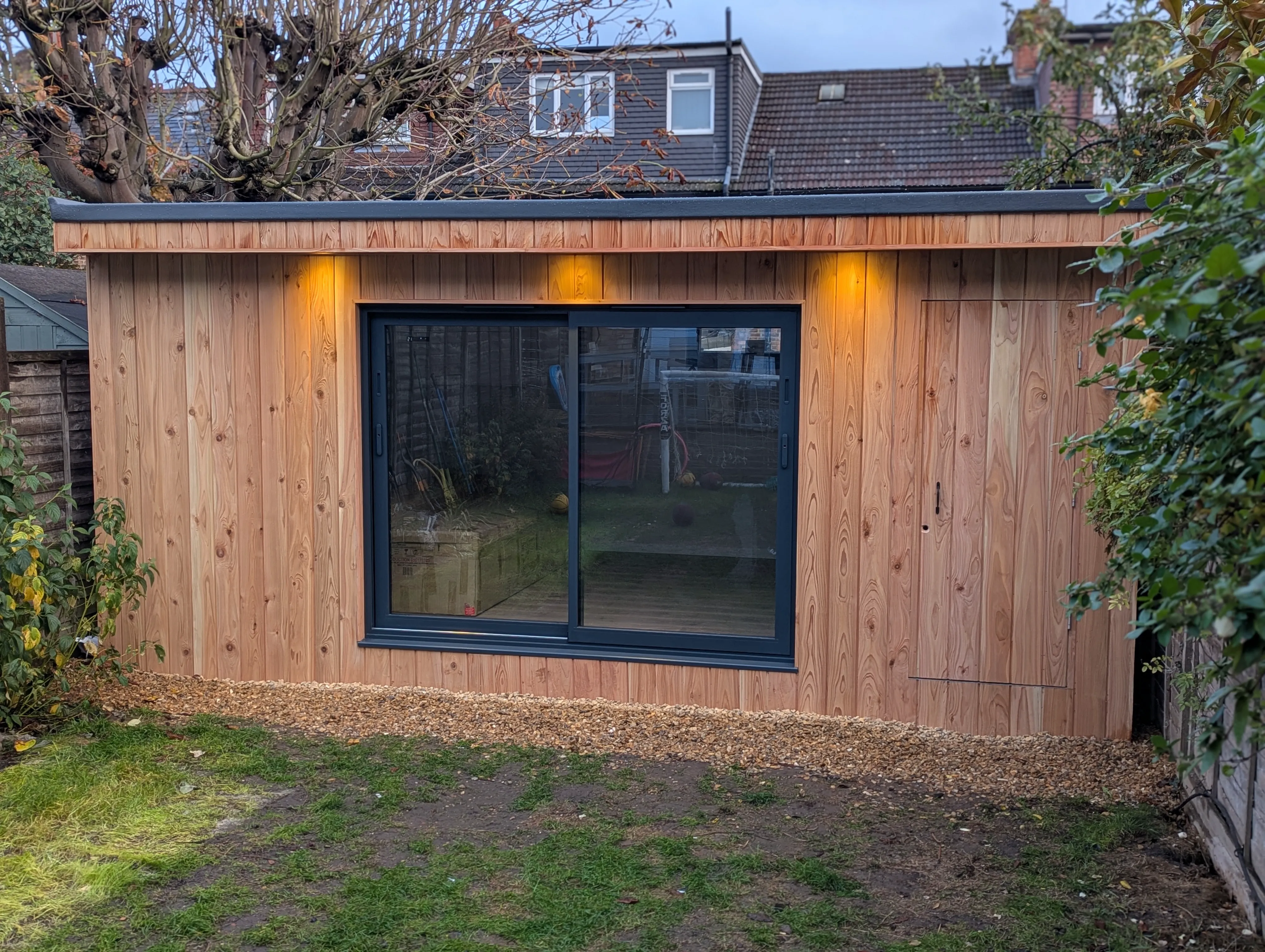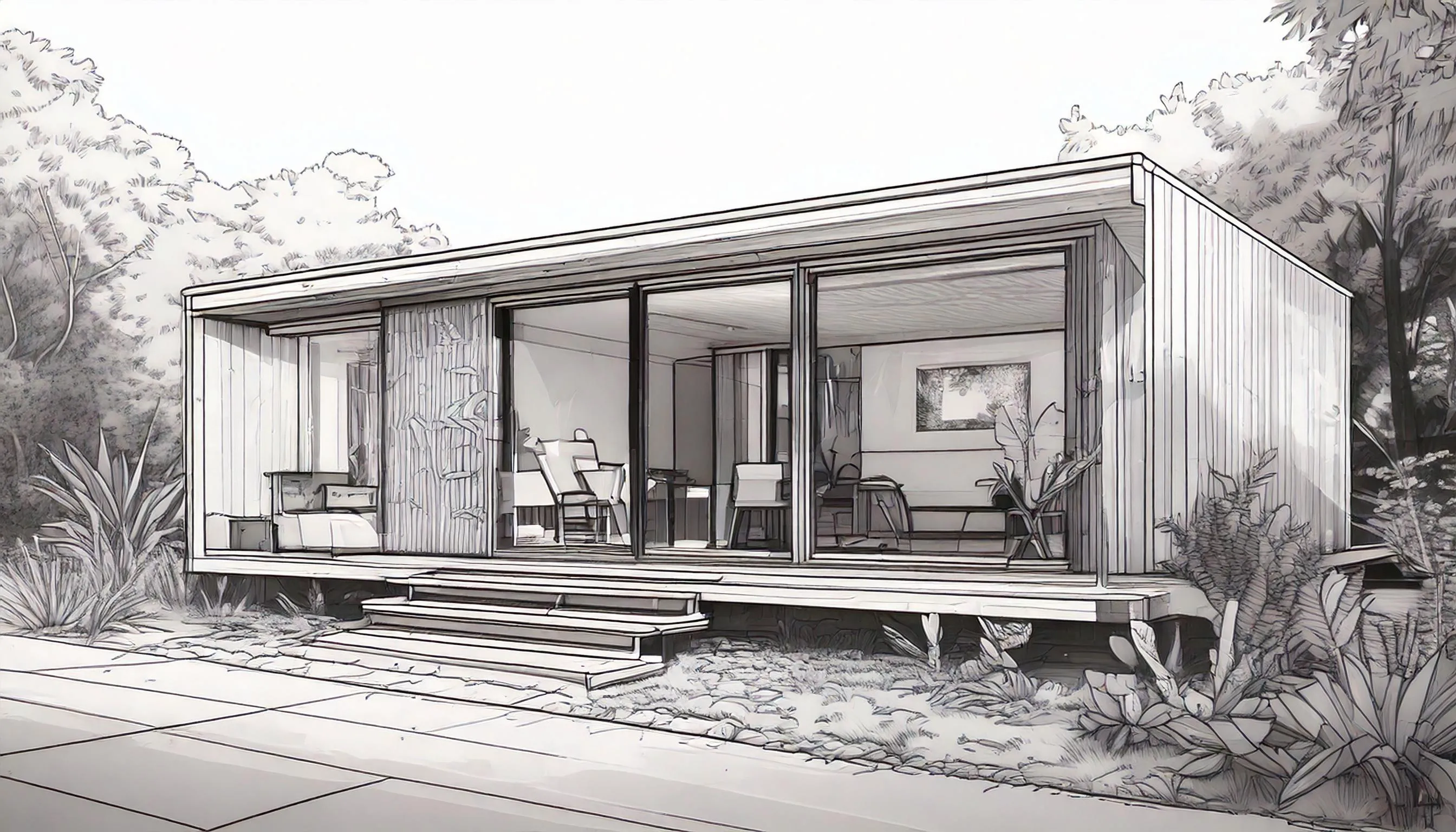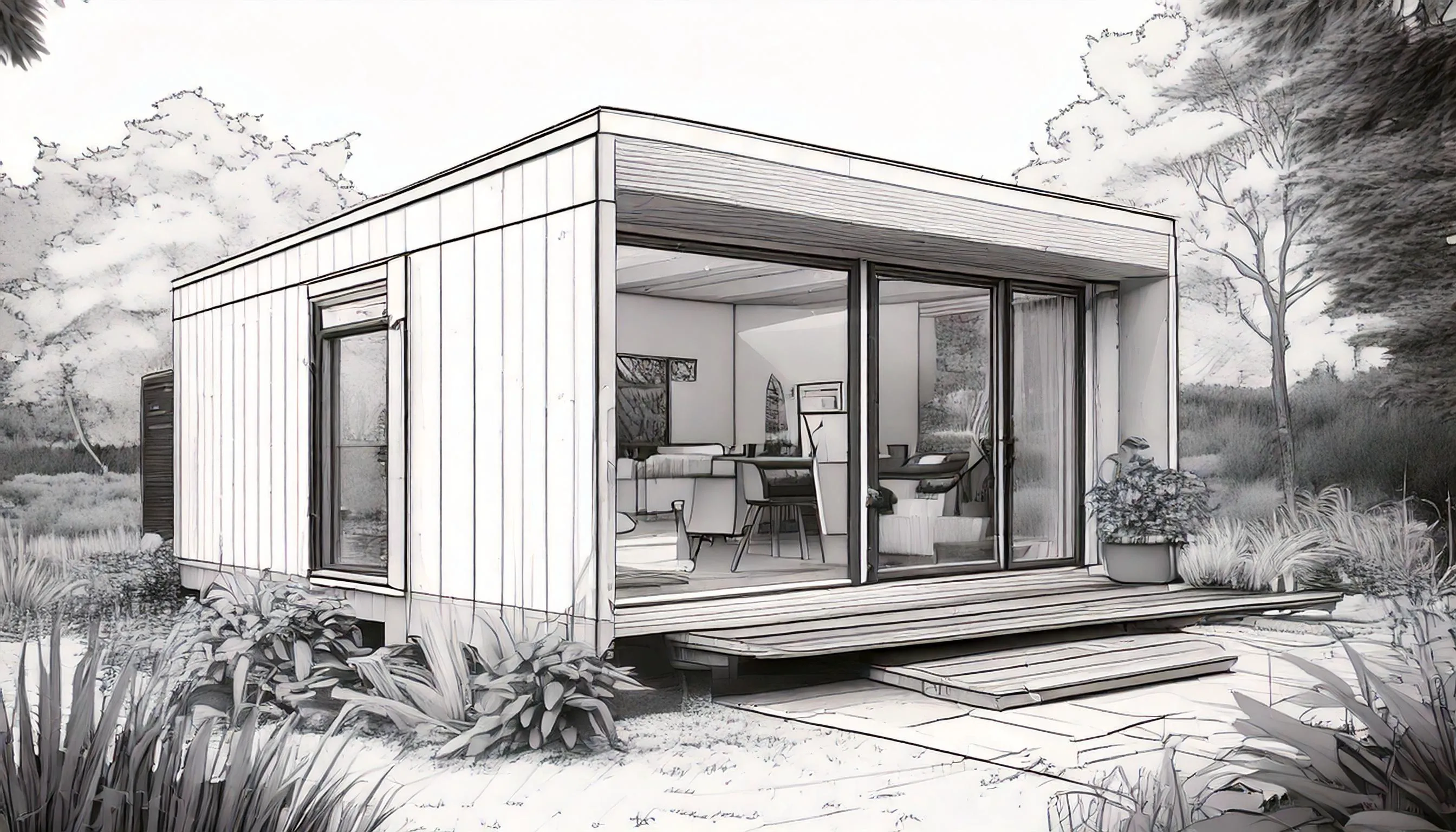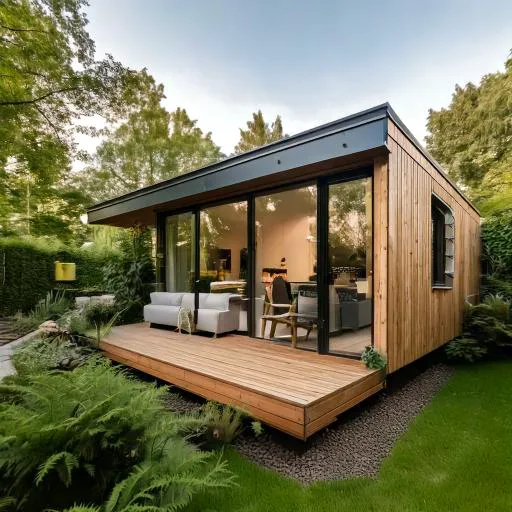Published September 12th, 2025
Choosing your garden room's external cladding can feel overwhelming – and honestly, that makes complete sense. You're looking at a significant investment that'll affect how your garden room looks, performs, and lasts for decades to come. The cladding you pick influences everything from how much maintenance you'll be doing to whether you'll need Building Regulations approval.
Here's the thing: there's no universally "best" cladding material. What matters is finding the right choice for your specific situation, budget, and how you actually want to live with your garden room. Some people love the idea of treating their cedar cladding every couple of years – it's therapeutic, they say. Others just want to hose it down once a year and be done with it.
This guide walks you through every major cladding option available for UK garden rooms. We'll be straight with you about the real advantages and honest limitations of each material, so you can make a decision you'll still be happy with years down the line.
Why Your Cladding Choice Matters More Than You Think
Before we dive into specific materials, let's talk about why this decision has such far-reaching implications for your garden room project.
Cost Impact
Here's something that surprises people: external cladding represents 10-20% of your total garden room cost. That's not just the materials – it's also the significant labor time needed for installation. The difference between choosing a budget option versus a premium material could easily be over £2,000 for a typical 6m x 3m room. So this decision definitely affects your wallet.
Protection and Performance
Your cladding is basically your garden room's armor against everything the British weather can throw at it – rain, UV rays, temperature swings, you name it. Choose poorly here, and you could be looking at structural damage, poor thermal performance, or having to replace the whole thing much sooner than you'd planned.
Building Regulations Compliance
Here's where it gets interesting: your cladding choice can actually determine whether you need Building Regulations approval. If your garden room has over 15m² of internal floor area and sits within 1 meter of your boundary, you'll need 'substantially fire-resistant materials' to stay exempt from Building Regs. Your cladding definitely counts in this assessment.
Timber Cladding: Natural Beauty
Timber cladding is still the gold standard for natural aesthetics. There's something about real wood that manufactured materials just can't quite replicate – though they're getting closer every year.
Cedar: The Garden Room Gold Standard
Western Red Cedar has become the go-to choice for garden rooms, and there's good reason for that. It's lightweight, stable, naturally decay-resistant, and works beautifully. This resinous wood basically has its own built-in protection system.
Cedar - What you get:
- Lifespan: 50+ years (that's a proper long-term investment)
- Durability: BS EN 350 Class 2 rating – highly resistant to decay and insects thanks to natural oils
- Appearance: Beautiful natural wood with rich orange and red hues, straight grain, minimal knots
- Maintenance: Medium effort – occasional cleaning, oiling to keep the color vibrant
- Cost: Premium pricing at £50-65 per m² (around £1,380 for a 5m x 2m garden room)
- Fire resistance: Combustible unless specially treated (can be improved with treatments)
Best for: People who can afford the premium cost and really value that distinctive Cedar natural wood appearance and durability, where fire safety isn't a primary concern.
Siberian Larch: The Cedar Alternative
Think of Larch as Cedar's more affordable cousin. It performs brilliantly outdoors while giving you better value for your money.
Larch - What you get:
- Lifespan: 50+ years
- Durability: BS EN 350 Class 2 rating – can actually be left untreated outdoors
- Appearance: Golden color with interesting grain patterns, typically more knotty than Cedar
- Maintenance: Medium effort – occasional cleaning and oiling to maintain color
- Cost: Medium pricing at £40-50 per m² (around £1,080 for a 5m x 2m room) – roughly 30% less than Cedar
- Fire resistance: Combustible unless specially treated
Best for: Anyone who wants Cedar's characteristics but at a more manageable price point, and doesn't mind a slightly different aesthetic.
Thermowood: Enhanced Performance
This is basically softwood (usually Nordic pine or spruce) that's been heat-treated to improve its performance. Think of it as timber that's been through boot camp.
Thermowood - What you get:
- Lifespan: 20-30 years with proper care
- Durability: Heat treatment brings it up to Class 2 standard
- Appearance: Attractive dark hues from the heat treatment, uniform brown color
- Maintenance: Medium to high effort – treatment every 2-3 years to extend its life
- Cost: Medium pricing at £30-40 per m² (around £840 for a 5m x 2m room)
- Fire resistance: Combustible unless specially treated
Best for: People who want natural timber durability at the lowest cost point.
Composite Cladding: Modern Engineering
Composite materials are where technology meets practicality. They're designed to give you the look of natural materials with much better performance characteristics.
Wood-Plastic Composite: Low-Maintenance Alternative
This is basically recycled wood fibers mixed with plastic, engineered for long-lasting performance with minimal fuss.
Composite - What you get:
- Lifespan: 25-50 years
- Durability: Exceptional – resistant to rot, insects, and weathering
- Appearance: Consistent, uniform look that doesn't change over time (though some say it lacks authenticity)
- Maintenance: Minimal – occasional cleaning only
- Cost: Medium to high at £40-60 per m² (around £1,200 for a 5m x 2m room)
- Fire resistance: Medium with Euroclass C or D rating
Best for: People who don't mind an artificial but clean look and are willing to pay a premium for low maintenance and exceptional durability.
Making Your Decision: Key Questions to Consider
Choosing the right cladding comes down to honest assessment of your priorities, circumstances, and long-term plans.
Budget Reality Check
Are you optimizing for lowest initial cost or best lifetime value? Factor in maintenance costs, replacement timeline, and your own time investment. Also consider: will you maintain the cladding yourself or hire professionals? This significantly affects the lifetime cost of different materials.
Aesthetic Preferences
If you value the natural aesthetic, solid wood cladding is your better choice. If you want a lower maintenance solution, composite may be preferable. Also think about this: are you comfortable with materials that change appearance over time, or do you prefer consistent appearance throughout their lifespan?
Practical Considerations
Honestly assess your willingness and ability to perform regular maintenance. Choosing high-maintenance materials without commitment to proper care leads to poor performance and premature failure. Consider your local weather conditions, orientation, and exposure to driving rain, strong winds, or extreme temperatures.
The Precision Rooms Approach
We understand that cladding choice is personal and depends on your unique circumstances, preferences, and priorities. Rather than pushing a single "best" solution, we try to provide you with as much relevant information as possible to help you navigate the decision.
When you use our Room Planner, you'll be able to see the price difference between types of cladding and visualize the aesthetics via our 3D color render. We also provide all relevant information on durability and maintenance at the point of selection.
Conclusion: Making the Choice That's Right for You
There's no universally perfect cladding material – only the perfect choice for your specific situation, priorities, and preferences. The key is understanding the real-world implications of each option rather than relying on marketing claims or theoretical advantages.
Quick Decision Guide:
Choose Cedar or Larch cladding if you:
- Value natural beauty and character above convenience
- Are happy with occasional maintenance to maintain color
- Want proven traditional performance
- Are comfortable paying a premium for durability and aesthetics
Choose Treated softwood (Thermowood) if you:
- Value the traditional look of natural wood
- Your budget doesn't stretch to Cedar or Larch
- You're happy with occasional maintenance (re-treatment every few years)
- You're after a painted or stained wooden exterior
Consider composite cladding if you:
- Prioritize low maintenance and consistent appearance
- Want durability without natural material limitations
- You're willing to pay premium prices for convenience
- You need fire-resistant properties for regulatory compliance
The most successful garden room cladding choices result from honest assessment of priorities, realistic understanding of maintenance commitments, and proper implementation regardless of material selected. Take time to consider not just how each option looks in the showroom, but how it will perform and appear after years of real-world exposure.
Your cladding choice will influence your garden room experience for decades. Make it count by choosing based on informed understanding rather than initial impressions or lowest price. The right material, properly specified and expertly installed, becomes an investment in long-term satisfaction and performance.
Ready to choose the perfect cladding for your garden room?
At Precision Rooms, our material expertise and project experience help you navigate these decisions with confidence. From traditional cedar through to cutting-edge composites and metals, we ensure your cladding choice delivers exactly the performance and appearance you expect. Design with our Room Planner today.



